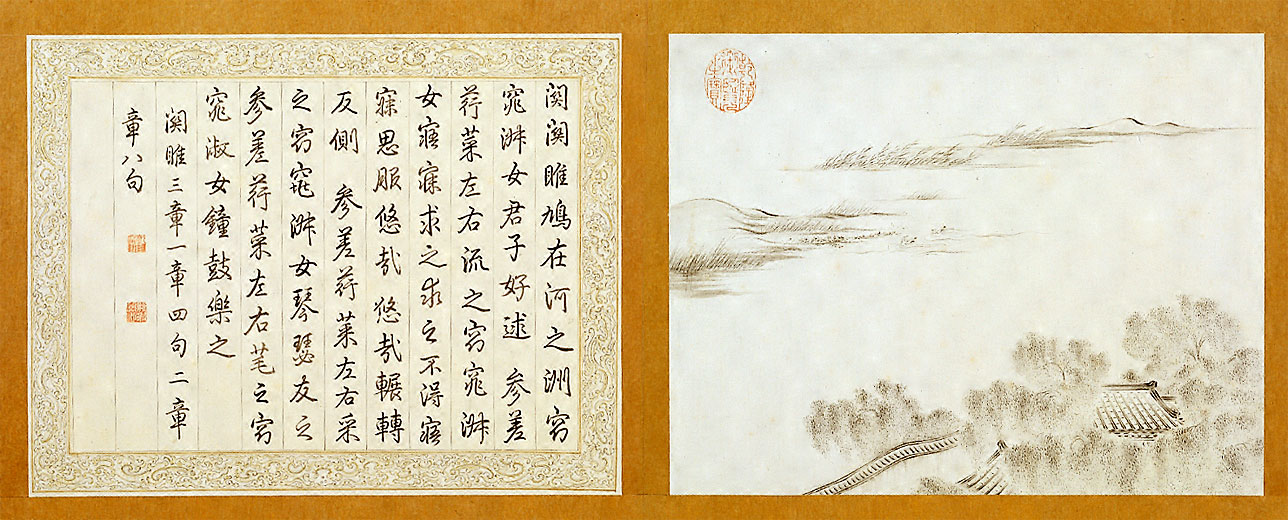Classical Chinese
 | tp = wúnyán
| gr = wenyan
| bpmf =
| mi =
| j = man4 jin4
| y = màhnyìhn
| ci =
| poj = bûn-giân
| phfs = vùn-ngièn
| wuu = ven去 ghe
| buc = ùng-ngiòng
| gan =
| oc-bs = *mən ŋan
| mc = mjun ngjon
| hanja = 漢文
| hangul = 한문
| rr = hanmun
| kanji = 漢文
| romaji = kanbun
| qn =
| chuhan =
| c2 = 古文
| l2 = ancient writing
| p2 = gǔwén
| w2 =
| tp2 = gǔwún
| gr2 = guuwen
| bpmf2 =
| mi2 =
| j2 = gu2 man4
| y2 = gúmàhn
| ci2 =
| poj2 = kó͘-bûn
| phfs2 = kú-vùn
| wuu2 = ku去 ven去
| buc2 = gū-ùng
| gan2 =
| oc-bs2 = *kˤaʔ mən
| mc2 = kuX mjun
}}
Classical Chinese and , as well as in written vernacular Chinese. The term is read as in Japanese, in Korean, and or in Vietnamese.}} is the language in which the classics of Chinese literature were written, from . For millennia thereafter, the written Chinese used in these works was imitated and iterated upon by scholars in a form now called Literary Chinese, which was used for almost all formal writing in China until the early 20th century. Each written character corresponds to a single spoken syllable, and almost always to a single independent word. As a result, the characteristic style of the language is comparatively terse.
| tp = wúnyán
| gr = wenyan
| bpmf =
| mi =
| j = man4 jin4
| y = màhnyìhn
| ci =
| poj = bûn-giân
| phfs = vùn-ngièn
| wuu = ven去 ghe
| buc = ùng-ngiòng
| gan =
| oc-bs = *mən ŋan
| mc = mjun ngjon
| hanja = 漢文
| hangul = 한문
| rr = hanmun
| kanji = 漢文
| romaji = kanbun
| qn =
| chuhan =
| c2 = 古文
| l2 = ancient writing
| p2 = gǔwén
| w2 =
| tp2 = gǔwún
| gr2 = guuwen
| bpmf2 =
| mi2 =
| j2 = gu2 man4
| y2 = gúmàhn
| ci2 =
| poj2 = kó͘-bûn
| phfs2 = kú-vùn
| wuu2 = ku去 ven去
| buc2 = gū-ùng
| gan2 =
| oc-bs2 = *kˤaʔ mən
| mc2 = kuX mjun
}}
Classical Chinese and , as well as in written vernacular Chinese. The term is read as in Japanese, in Korean, and or in Vietnamese.}} is the language in which the classics of Chinese literature were written, from . For millennia thereafter, the written Chinese used in these works was imitated and iterated upon by scholars in a form now called Literary Chinese, which was used for almost all formal writing in China until the early 20th century. Each written character corresponds to a single spoken syllable, and almost always to a single independent word. As a result, the characteristic style of the language is comparatively terse.Starting in the 2nd century CE, use of Literary Chinese spread to the countries surrounding China, including Vietnam, Korea, Japan, and the Ryukyu Islands, where it represented the only known form of writing. Literary Chinese was adopted as the language of civil administration in these countries, creating what is known as the Sinosphere. Each additionally developed systems of readings and annotations that enabled non-Chinese speakers to interpret Literary Chinese texts in terms of the local vernacular.
While not static throughout its history, its evolution has traditionally been guided by a conservative impulse: many later changes in the varieties of Chinese are not reflected in the literary form. Due to millennia of this evolution, Literary Chinese is only partially intelligible when read or spoken aloud for someone only familiar with modern vernacular forms. Literary Chinese has largely been replaced by written vernacular Chinese among Chinese speakers; speakers of non-Chinese languages have similarly abandoned Literary Chinese in favour of their own local vernaculars. Although varieties of Chinese have diverged in various directions from the Old Chinese words in the Classical lexicon, many cognates can still be found. Provided by Wikipedia
-
1
-
2by Wu, Fang, Jiang, Yuan, Wen, Yan, Zhao, Shoudong, Xu, HuiGet access
Published in Environmental Research Letters (2021)
Get access
Get access
Article in Journal/Newspaper -
3by Wu, Fang, Jiang, Yuan, Zhao, Shoudong, Wen, Yan, Li, Wenqing, Kang, MuyiGet access
Published in Global Change Biology (2022)
Get access
Get access
Article in Journal/Newspaper -
4by Xiaohua Chen, Yuan-Gang You, You-Hua Yuan, Lian Chao Yuan, Ying Zhang, Wen YanGet access
Published in PLOS Neglected Tropical Diseases (2018)
Get access
Article in Journal/Newspaper -
5by Wei-Ping Li, Yan-Wu Zhang, Mingquan Mu, Xue-Li Shi, Wen-Yan Zhou, Jin-Jun JiGet access
Published in Advances in Climate Change Research (2023)
Get access
Article in Journal/Newspaper -
6by Pan Qiong-Hua, Zheng Zhong-Yi, Yang Jun, Wen Yan, Yuan Lian-Chao, Li Huan-Ying, Steven G. Reed, Malcolm S. DuthieGet access
Published in Journal of Tropical Medicine (2013)
Get access
Article in Journal/Newspaper -
7by Jenny G H Low, Adrian Ong, Li Kiang Tan, Shera Chaterji, Angelia Chow, Wen Yan Lim, Koon Wui Lee, Robert Chua, Choon Rong Chua, Sharon W S Tan, Yin Bun Cheung, Martin L Hibberd, Subhash G Vasudevan, Lee-Ching Ng, Yee Sin Leo, Eng Eong OoiGet access
Published in PLoS Neglected Tropical Diseases (2011)
Get access
Article in Journal/Newspaper